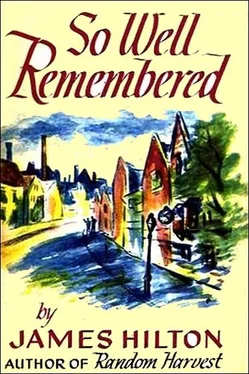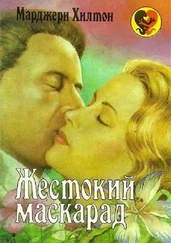Джеймс Хилтон - So Well Remembered
Здесь есть возможность читать онлайн «Джеймс Хилтон - So Well Remembered» весь текст электронной книги совершенно бесплатно (целиком полную версию без сокращений). В некоторых случаях можно слушать аудио, скачать через торрент в формате fb2 и присутствует краткое содержание. Год выпуска: 1945, Жанр: Проза, на английском языке. Описание произведения, (предисловие) а так же отзывы посетителей доступны на портале библиотеки ЛибКат.
- Название:So Well Remembered
- Автор:
- Жанр:
- Год:1945
- ISBN:нет данных
- Рейтинг книги:5 / 5. Голосов: 1
-
Избранное:Добавить в избранное
- Отзывы:
-
Ваша оценка:
- 100
- 1
- 2
- 3
- 4
- 5
So Well Remembered: краткое содержание, описание и аннотация
Предлагаем к чтению аннотацию, описание, краткое содержание или предисловие (зависит от того, что написал сам автор книги «So Well Remembered»). Если вы не нашли необходимую информацию о книге — напишите в комментариях, мы постараемся отыскать её.
So Well Remembered — читать онлайн бесплатно полную книгу (весь текст) целиком
Ниже представлен текст книги, разбитый по страницам. Система сохранения места последней прочитанной страницы, позволяет с удобством читать онлайн бесплатно книгу «So Well Remembered», без необходимости каждый раз заново искать на чём Вы остановились. Поставьте закладку, и сможете в любой момент перейти на страницу, на которой закончили чтение.
Интервал:
Закладка:
“That’s different… Go to sleep now.”
Not till the following morning was Livia told that her father was dead; and this was not true.
She had been a baby at the time of her father’s trial and sentence, so that the problem of how much to tell her, and how to explain his absence or her mother’s distress, had not immediately arisen. The year had been the last one of the nineteenth century or the first of the twentieth (according to taste and argument); events in South Africa had gone badly, and men were being recruited for the least romantic, though by its supporters and contemporaries the most romanticized, of all England’s wars. Emily Channing, who was a romanticist about that and everything else, concocted a dream in which her husband obtained his release to enlist, and eventually, on kop or veldt, ‘made good’ by some extraordinary act of gallantry which would earn him the King’s pardon and possibly a V.C. as well. It was an absurd idea, for British justice is unsentimental to the point of irony, preferring to keep the criminal fed, clothed, and housed in perfect safety at the country’s expense, while the non- criminals risk and lose their lives on foreign fields. Channing knew this, and was not in the least surprised when the appeal his wife had persuaded him to make was turned down. But Emily was heartbroken, the more so as she had already told Livia that her father was ‘at the war’. It was a simple explanation in tune with the spirit of the times; Emily had found no difficulty in giving it, but Livia was really too young to know what or where ‘the war’ was, and only gradually absorbed her father’s absence into a private imagery of her own.
A couple of years later, however, the South African War was history, and there came that grey October day in 1903 when even a prison-interview between husband and wife could not avoid discussion of the matter. For John Channing, after several years to think things over, was in a somewhat changed mood. Till then Emily and he had always comforted each other with talk of her waiting for him and the ultimate joys of reunion; but now, during the half-hour that was all they were allowed once a month, he suddenly told her they must both face facts. And the facts, he pointed out, were that with the utmost remission of sentence for good conduct he would not be released until 1913, by which time he would be fifty, she would be thirty-eight, and Livia fourteen.
But Emily (as before remarked) was a romanticist, and the interview was distressing in a way that no earlier one had been. Sincerely loving her husband, she could accept only two attitudes as proof of his continued love for her: that he should, as heretofore, expect her to wait for him, or that he should melodramatically beg her to ‘try to forget’ him. And now, in this changed mood, he was doing neither. He was merely advising her that she should live her life realistically, feel free to make any association elsewhere that might at any time promise happiness, and forget him without feeling guilty if that should seem the easiest thing to do. If, on the other hand, this did not happen, and at the end of the long interval they both felt they could resume their lives together, then that would clearly be an experiment to be attempted. As for Livia, the suggestion he made was equally realistic—that the child should be told the plain truth as soon as she was old enough to understand it. “Why not? You certainly won’t be able to carry on with the war story now that there isn’t a war.”
“I could tell her you were abroad,” Emily suggested, “doing some important work. Or I could say you were an explorer… And perhaps there WILL be another war somewhere soon.”
John Channing smiled—and his smile, Emily felt, was also different from usual. It was a slanting, uncomfortable smile, and it lasted a long time before he answered: “No, Emily—just tell her the truth. Of course you’ll have to be judge of the right moment, but there’s really no way out of telling her, once she begins to have school friends. And it would be far better for her to learn the facts from you than to pick them up in garbled scraps from other children.”
“I shall tell her you’re innocent, of course.”
The smile recurred. “Oh no, NO, Emily—don’t ever do that. First, because I’m not, and second, because it would give her a grudge to go through life with—the worst possible thing for a youngster. Say that I’m guilty of what I’m here for, but you can add, if you like, that I’m not personally a vile character… That is, if you agree that I’m not.”
“Wouldn’t that be very hard for her to understand at her age?”
“At any age, Emily. Sometimes even I find it hard to grasp. But I’d rather have her puzzled about me than indignant on my behalf.”
But Emily, distressed as she was, nevertheless declined to accept that alternative herself. To be puzzled was the one thing she abhorred, and to avoid it she could almost always discover a romantic formula. That accounted for her mood when, towards twilight as she returned home after the interview, she saw Livia wandering in the road below the clough; it was why she failed to scold her, or to listen to her prattle about ghosts; and it was why, next morning, after long consultations with Sarah and Miss Fortescue, she told Livia the only possible romantic lie about her father except that he was innocent; and that was, that he was dead. He had been killed, she said, in South Africa, and the war for which he had given his life had ended in victory. Emily found it possible to say all this convincingly, with genuine tears, and without going into awkward details. Doubtless in a few years (she reckoned) the truth would have to come out, but when it did it might even seem relatively GOOD news to a child of maturer intelligence; while for the time being it surely could not upset Livia too much to think that a father whom she did not remember had died a hero. Pride more than grief seemed the likely emotion.
Livia felt neither, however, so much as a queer kind of relief. She wept easily when her mother wept, for much the same reason that she made imitative noises when the dog barked or the cat mewed; but she had stared out of the drawing-room window with such protracted hopes of her father’s return that it was almost pleasanter not to have to expect him any more. Instead, she promptly added a new legend to that of the three little girls whose ghosts were supposed to haunt the neighbourhood. She persisted in telling people (the people at Stoneclough, for she never met anyone else) that she often saw her father’s ghost in the clough, smoking and walking slowly and looking at the trees. She was so circumstantial in describing all this that Miss Fortescue grew nervous about driving to Browdley after dark, though there were several flaws in Livia’s story when Miss Fortescue analysed it. For instance, how could Livia, who did not remember her father, even pretend to recognize his ghost? And then, too, the detail about the smoking. Not only had John Channing been a non-smoker, but Miss Fortescue was also sure that ghosts could not smoke. Livia, however, replied stoutly: “My daddy’s ghost DOES.”
Which presented a problem that Emily, Miss Fortescue, Sarah, Dr. Whiteside (the family physician), and a few others were wholly unable to evaluate, much less to solve. Could it be that the child, in addition to BELIEVING a lie (which was only right and proper, in the circumstances), was also capable of TELLING one? Miss Fortescue thought not, again adducing the ‘smoking’ detail. If Livia had uttered a falsehood with deliberate intent to deceive, surely she would not have invented such an incongruity; therefore, did it not prove that she was speaking what at least she regarded as the truth?
Читать дальшеИнтервал:
Закладка:
Похожие книги на «So Well Remembered»
Представляем Вашему вниманию похожие книги на «So Well Remembered» списком для выбора. Мы отобрали схожую по названию и смыслу литературу в надежде предоставить читателям больше вариантов отыскать новые, интересные, ещё непрочитанные произведения.
Обсуждение, отзывы о книге «So Well Remembered» и просто собственные мнения читателей. Оставьте ваши комментарии, напишите, что Вы думаете о произведении, его смысле или главных героях. Укажите что конкретно понравилось, а что нет, и почему Вы так считаете.










